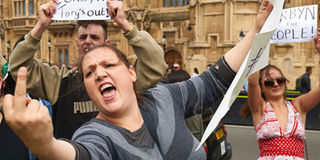The case for using photographs of newsmakers giving the finger

A demonstrator among others gives the finger outside the British Parliament in central London on June 26, 2016. A reader said it was unethical and unacceptable to publish this photo after it appeared in the 'Daily Nation' of June 27, 2016. PHOTO | NIKLAS HELLE'N | AFP
What you need to know:
- Today, editors allow their use in news stories without blinking an eye, especially after the HIV/Aids pandemic.
- More importantly, it’s becoming increasingly common even for respectable media to allow the use of profanities and dirty words when they are an essential or integral to the understanding of a news story.
The Daily Nation of June 27 published on page 29 (international news) a picture of a woman demonstrator giving the middle finger. She was pictured in a group of demonstrators holding placards outside the British Parliament in London over the Brexit vote. The picture was taken and distributed by the French news agency AFP.
In Western culture, flipping the middle finger, or flipping the bird as they say in America, is one of the most obscene hand gestures. With that gesture, the finger becomes a phallic symbol and the message intended is the equivalent of “Go f**k yourself”, or “Shove it up your **s”. The use of asterisks here reflects the extent to which newspapers will go to avoid using dirty words or obscenities, even though nobody is in any doubt as to what they stand for.
However, flipping the bird as a symbol of extreme insult and belittlement has not been widely assimilated in Africa. In West Africa, for example, what is considered insulting is a vertical fist with the thumb lying on the index finger, while in some Kenyan communities, it is summoning someone by waging the pointing finger, which is considered suitable only for dogs.
In our cultures, we tend to use the pointing finger (index finger), not the middle finger, when words are not enough to say what we want to say. Look at the pictures of our public speakers from Johnson Muthama and Hassan Joho to Moses Kuria and Aden Duale. They all use the pointing finger (which can easily be mistaken for the bird).
NOTHING UNTOWARD
Most of the readers who flipped to page 29 of the Daily Nation, I venture to say, looked at the picture and they did not notice anything untoward. But Abu Ayma of the Jamia Mosque in Nairobi did. He said the picture of the woman giving the middle finger was obscene. "The picture was in bad taste, promotes obscenities and vulgarity and it is unprofessional to allow its publication as it clearly goes against the Nation Media Group editorial policy which states: ‘The media should not publish anything that is obscene, vulgar or offensive to public good taste. A story, photograph or drawing/cartoon of questionable taste should have significant news value to justify its usage'".
In addition, he said, the Media Council of Kenya's code of conduct allows the publication of such photographs only if it was made in the public interest.
“This was not the case with the AFP vulgar photo,” he said. “It is unethical and unacceptable to publish such photos in a respectable publication like the Daily Nation.”
Mr Ayma correctly cited the Nation Media Group's editorial policy and the Media Council of Kenya's code of conduct.
But I’m still struggling with his complaint. Assuming he was the only reader offended, is something offensive if the majority of the readers are not offended? Even if the picture was offensive, was it justified in the public interest or for being of significant news value? Does it matter that this was the picture of a Western woman using a Western obscenity to oppose a Western (British) idea? Would the picture be acceptable if the woman was Wanjiku demonstrating against IEBC or Syokimau Police Post? What if it was Madonna or her sidekick M.I.A. performing—not in State House in Nairobi—but at the Super Bowl?
Besides, what is acceptable as polite language (verbal and non-verbal) keeps changing as societies change. Not so long ago such words as “penis” and “vagina” could not be used in our media.
Today, editors allow their use in news stories without blinking an eye, especially after the HIV/Aids pandemic. More importantly, it’s becoming increasingly common even for respectable media to allow the use of profanities and dirty words when they are an essential or integral to the understanding of a news story.
The complaint by Mr Ayma calls for a tough decision, which the Daily Nation took by publishing that picture. If you were the editor, would you have used the picture?
Send your complaints to [email protected] or text or call 0721989264.





